God drives down from the mountains behind the wheel of a Jeep, in this poem by Tracy K. Smith, former U.S. poet laureate. Smith illuminates the ambrosial bounty of Texas Hill Country, where she’s joined by country music singer-songwriter Jimmie Dale Gilmore, members of both Christian and Jewish communities, and host Elisa New.
Special thanks to our humanities advisers: Camille Dungy and Ramie Targoff
Interested in learning more? Poetry in America offers a wide range of courses, all dedicated to bringing poetry into classrooms and living rooms around the world.
He comes down from the hills, from
The craggy rock, the shrubs, the scrawny
Live oaks and dried-up junipers. Down
From the cloud-bellies and the bellies
Of hawks, from the caracaras stalking
Carcasses, from the clear, sun-smacked
Soundlessness that shrouds him. From the
Weathered bed of planks outside the cabin
Where he goes to be alone with his questions.
God comes down along the road with his
Windows unrolled so the twigs and hanging
Vines can slap and scrape against him in his jeep.
Down past the buck caught in the hog trap
That kicks and heaves, bloodied, blinded
By the whiff of its own death, which God—
Thank God—staves off. He downshifts,
Crosses the shallow trickle of river that only
Just last May scoured the side of the canyon
To rock. Gets out. Walks along the limestone
Bank. Castor beans. Cactus. Scat of last
Night’s coyotes. Down below the hilltops,
He squints out at shadow: tree backing tree.
Dark depth the eyes glide across, not bothering
To decipher what it hides. A pair of dragonflies
Mate in flight. Tiny flowers throw frantic color
At his feet. If he tries—if he holds his mind
In place and wills it—he can almost believe
In something larger than himself rearranging
The air. He squints at the jeep glaring
In bright sun. Stares a while at patterns
The tall branches cast onto the undersides
Of leaves. Then God climbs back into the cab,
Returning to everywhere.
He comes down from the hills, from
The craggy rock, the shrubs, the scrawny
Live oaks and dried-up junipers. Down
From the cloud-bellies and the bellies
Of hawks, from the caracaras stalking
Carcasses, from the clear, sun-smacked
Soundlessness that shrouds him. From the
Weathered bed of planks outside the cabin
Where he goes to be alone with his questions.
God comes down along the road with his
Windows unrolled so the twigs and hanging
Vines can slap and scrape against him in his jeep.
Down past the buck caught in the hog trap
That kicks and heaves, bloodied, blinded
By the whiff of its own death, which God—
Thank God—staves off. He downshifts,
Crosses the shallow trickle of river that only
Just last May scoured the side of the canyon
To rock. Gets out. Walks along the limestone
Bank. Castor beans. Cactus. Scat of last
Night’s coyotes. Down below the hilltops,
He squints out at shadow: tree backing tree.
Dark depth the eyes glide across, not bothering
To decipher what it hides. A pair of dragonflies
Mate in flight. Tiny flowers throw frantic color
At his feet. If he tries—if he holds his mind
In place and wills it—he can almost believe
In something larger than himself rearranging
The air. He squints at the jeep glaring
In bright sun. Stares a while at patterns
The tall branches cast onto the undersides
Of leaves. Then God climbs back into the cab,
Returning to everywhere.
Tracy K. Smith, “Hill Country” from Such Color: New and Selected Poems. Copyright ©
2018 by Tracy K. Smith. Used with the permission of The Permissions Company, LLC on behalf of
Graywolf Press, Minneapolis, Minnesota, www.graywolfpress.org.
“I don't necessarily feel like my relationship with the Old Testament is what my Sunday School teachers intended it to be. But it's in there. And so my wrestling with space, time, place, death, silence, questions, doubt - is a kind of theology, I think,” says Tracy K. Smith. She continues: “The poem, if it's succeeding in some way, should bring you into the part of yourself where that type of thought process is possible.”
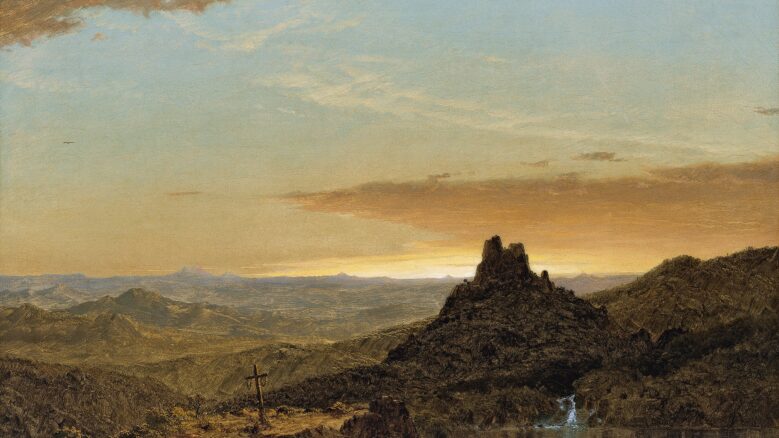
The vastness of the American landscape has a transcendent power. The 19th century painter Frederic Edwin Church captured the majesty in his paintings of the mountains, waterfalls, and sunsets that color the horizon. Notice the cross in the foreground. How does a transcendent landscape relate to a spiritual experience? From the early colonists to the present day, these rolling hills have conjured biblical landscapes and many, as above, have been adorned with religious symbols. Image courtesy of Museo Nacional Thyssen-Bornemisza, Madrid.
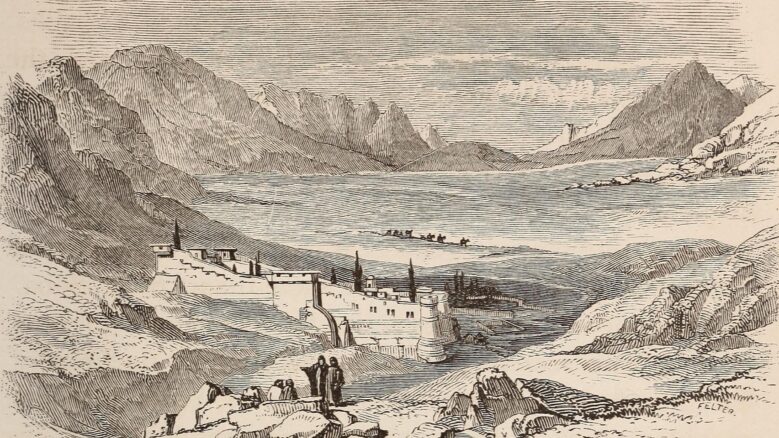
Mount Sinai, where Moses received the Ten Commandments, is one such biblical landscape. In this drawing, from a 19th century travel guide to the holy lands, we can see how the verdant desert resembles the American southwest. Tracy K. Smith’s poem alludes to both: “The craggy rock, the shrubs, the scrawny / Live oaks and dried-up junipers.” Image credit: Internet Archive
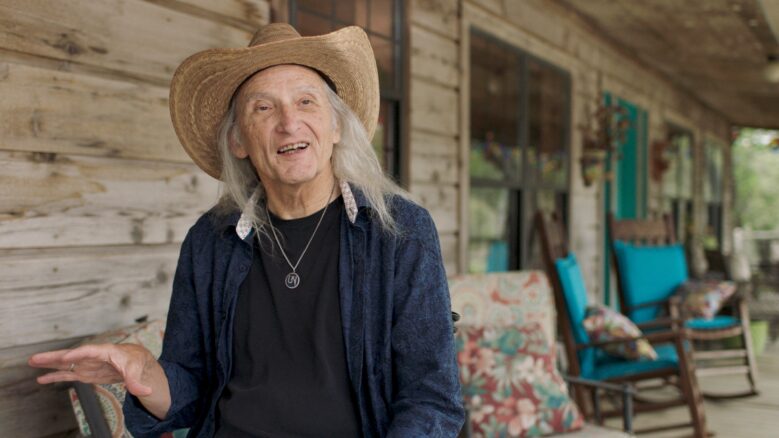
“This area that we live in is called the Hill Country. That's the nickname for this area of central Texas. It's hills, but it's also desert. It's thorny. It's harsh in certain ways. And at the same time, it's very soft and beautiful.”—Jimmie Dale Gilmore, Singer, Songwriter
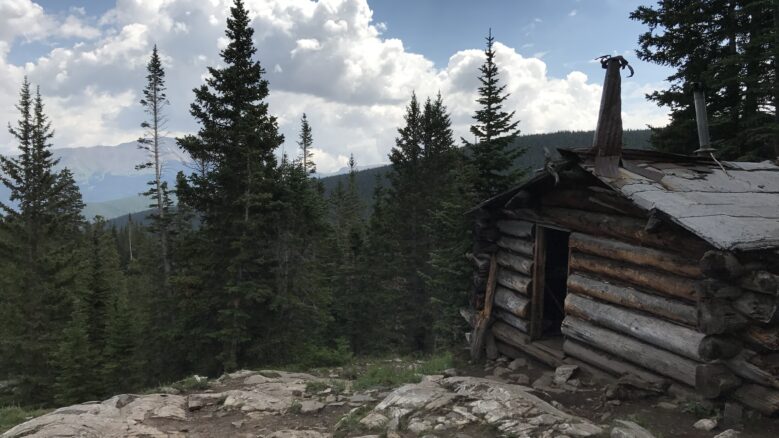
“From the / Weathered bed of planks outside the cabin / Where he goes to be alone with his questions. / God comes down along the road with his / Windows unrolled so the twigs and hanging / Vines can slap and scrape against him in his jeep.” Image Credit: Chris Yunker
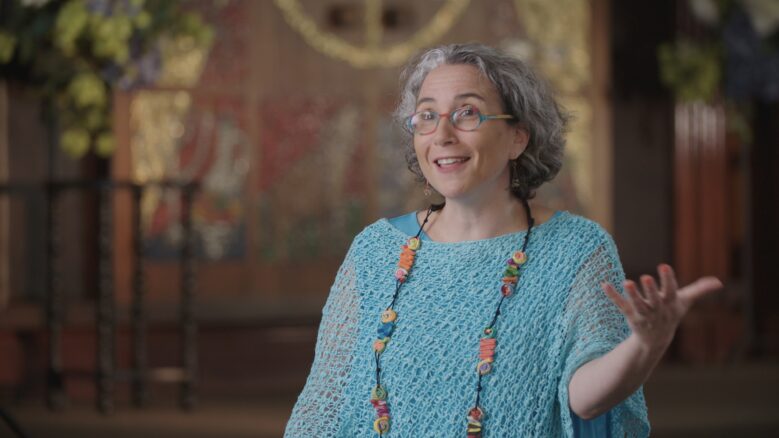
“When we go to Jerusalem, we usually say we go up to the mountains, and a lot of our psalms have also that reference of looking up to Jerusalem, looking up to the hills.”—Rabbi Claudia Kreiman, Temple Beth Zion in Brookline, MA